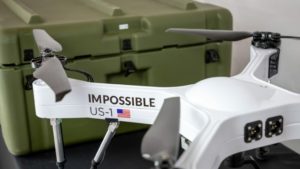
Impossible Aerospace made big news when it first began exhibiting a couple of years ago. The company was started by Spencer Gore, a young engineer who had worked for Tesla and had an elegant idea for improving flight endurance. The US-1 drone has battery cells integrated into the structure, allowing the aircraft to carry more power for it’s weight. Equipped with thermal sensors, it has about a 1 hour flight endurance – a significant gain over other drones of its size.
Now, Alpine 4 is making big news with their Impossible Aerospace acquisition – just as the company completed it’s final deliverable on a $1.5 million Small Business Innovation and Research (SBIR) U.S. Air Force contract. That’s a milestone that Alpine 4 says will open the door for new government contracts.
U.S. drone manufacturers may have a significant advantage in obtaining U.S. government contracts now. The recent U.S. Department of Commerce decision to add Chinese drone manufacturer DJI to it’s “entity” list has raised questions about purchasing Chinese-made drone tech and brought new focus to U.S. drone companies. In an interview with IT News Online, Spencer Gore and Kent Wilson, Alpine 4 CEO, had strong words about the effect of the decision on the U.S. industry.
“…The entity-listing of DJI is an important step in breaking up a monopoly that has crippled American innovation for too long. American drone companies, for the first time ever, will now have the playing field tilted to their advantage to build a robust and resilient domestic capability. They have the benefit of advanced, uniquely American technology: the world’s best microprocessors, advanced thermal cameras, graphics chips and machine learning hardware,” said Gore. “We are expanding aggressively to provide the market with next-generation unmanned systems at many price points and for many use cases. Alpine 4’s acquisition of Impossible Aerospace was only the first step in this initiative. News to be revealed over the next year will show the intensity and scale of our aim: to become the largest manufacturer of small UAS in North America.”
“Even with their inferior airframes and flight times, DJI’s market ownership of the commercial drone space was forecasted to continue its dominance for years to come,” said Wilson. “This new event completely opens up billions of dollars in the global market for the US-1 and its future variants to dominate the market. I am excited for Impossible Aerospace and for the opportunities this creates in the US commercial drone market.”
With the Impossible Aerospace acquisition Alpine 4 dove into the drone industry – and yesterday, the company published a press release announcing the acquisition of medical drone delivery platform Vayu US. Their VTOL delivery platform will expand Alpine 4’s reach in the industry.
“Vayu’s platforms complement the multicopters from Impossible Aerospace. Both Vayu and Impossible Aerospace have unique qualities that make their respective platforms advantageous and complementary, depending on the requirements of the end-user. Combining these two companies into the Alpine 4 portfolio of subsidiaries gives us a wider and larger scope of commercial clients and positions the company to capture a large market share of the commercial drone industry,” says Wilson.
With two platforms and a wide variety of applications in it’s portfolio , Alpine 4 is now poised to be a big story in the drone industry as well as in the market news.
Miriam McNabb is the Editor-in-Chief of DRONELIFE and CEO of JobForDrones, a professional drone services marketplace, and a fascinated observer of the emerging drone industry and the regulatory environment for drones. Miriam has penned over 3,000 articles focused on the commercial drone space and is an international speaker and recognized figure in the industry. Miriam has a degree from the University of Chicago and over 20 years of experience in high tech sales and marketing for new technologies.
For drone industry consulting or writing, Email Miriam.
TWITTER:@spaldingbarker
Subscribe to DroneLife here.